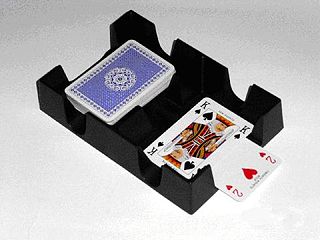Spit is a card game of the shedding family for two players. It is a form of competitive patience. The game is played until all of a player's cards are gone. It has a close variant known as Speed. Spit appears to have originated in the UK in the 1980s.

Canasta is a card game of the rummy family of games believed to be a variant of 500 rum. Although many variations exist for two, three, five or six players, it is most commonly played by four in two partnerships with two standard decks of cards. Players attempt to make melds of seven cards of the same rank and "go out" by playing all cards in their hands.

Uno, stylized as UNO, is a proprietary American shedding-type card game originally developed in 1971 by Merle Robbins in Reading, Ohio, a suburb of Cincinnati, that housed International Games Inc., a gaming company acquired by Mattel on January 23, 1992.

Crazy Eights is a shedding-type card game for two to seven players and the best known American member of the Eights Group which also includes Pig and Spoons. The object of the game is to be the first player to discard all of their cards. The game is similar to Switch, Mau Mau or Whot!.

500 rum, also called pinochle rummy, Michigan rummy, Persian rummy, rummy 500 or 500 rummy, is a popular variant of rummy. The game of canasta and several other games are believed to have developed from this popular form of rummy. The distinctive feature of 500 rum is that each player scores the value of the sets or cards they meld. It may be played by 2 to 8 players, but it is best for 3 to 5.

Slapjack, also known as Slaps, is a card game generally played among children. It can often be a child's first introduction to playing cards. The game is a cross between Beggar-My-Neighbour and Egyptian Ratscrew and is also sometimes known as Heart Attack. It is also related to the simpler 'slap' card games often called Snap.
Spite and malice, also known as cat and mouse, is a relatively modern American card game for two or more players. It is a reworking of the late 19th-century Continental game crapette, also known as Russian bank, and is a form of competitive solitaire, with a number of variations that can be played with two or three regular decks of cards.

Golf is a card game where players try to earn the lowest number of points over the course of nine deals.

Bourré is a trick-taking gambling card game primarily played in the Acadiana region of Louisiana in the United States of America. It is also played in the Greek island of Psara, with the name Boureki. The game's closest relatives are probably Spades and Euchre; like many regional games, Bourré sports many variant rules for both play and betting considerations.

Skip-Bo is a commercial version of the card game Spite and Malice, a derivative of Russian Bank, which in turn originates from Double Klondike. In 1967, Minnie Hazel "Skip" Bowman (1915–2001) of Brownfield, Texas, began producing a boxed edition of the game under the name SKIP-BO. In 1980 the game was purchased by International Games, which was subsequently bought by Mattel in 1992. A mobile version of the game for iOS was released by Magmic in September, 2013. There is a new version called "SKIP-BO Mod" that comes in a white and blue case.
Speed is a game for two players of the shedding family of card games, in which players try to get rid of all of their cards first. It is a form of competitive patience similar to Spit.

Kings in the Corner, or King's Corners is a multi-player patience or solitaire-style card game for two to four players using a standard 52-card pack, the aim being to be first to shed all one's hand cards.

Monopoly: The Card Game is loosely based on the board game Monopoly. The idea is to draw, trade and organize cards into "color-groups" along with bonus cards. Players take turns drawing and discarding cards until one completes a hand. The value of each player's hand is then counted and they receive the amount of Monopoly money they have earned. The first person to collect $10,000 wins.

Biriba is a Greek variant of rummy card game based on the Italian Pinnacola. It is played by two to six players, with two decks and 4 Jokers comprising 108 cards. If 6 players play, one more deck and two jokers more are added. Biriba can also be played by three players with or without partnership rules.
Royal Flush is a solitaire card game which is played with a deck of 52 playing cards. The game is so called because the aim of the game is to end up with a royal flush of any suit.

Uno is a video game based on the card game of the same name. It has been released for a number of platforms. The Xbox 360 version by Carbonated Games and Microsoft Game Studios was released on May 9, 2006, as a digital download via Xbox Live Arcade. A version for iPhone OS and iPod devices was released in 2008 by Gameloft. Gameloft released the PlayStation 3 version on October 1, 2009, and also released a version for WiiWare, Nintendo DSi via DSiWare, and PlayStation Portable. An updated version developed by Ubisoft Chengdu and published by Ubisoft was released for the PlayStation 4 and Xbox One in August 2016, Microsoft Windows in December 2016 and for the Nintendo Switch in November 2017.
Three thirteen is a variation of the card game Rummy. It is an eleven-round game played with two or more players. It requires two decks of cards with the jokers removed. Like other Rummy games, once the hands are dealt, the remainder of the cards are placed face down on the table. The top card from the deck is flipped face up and put beside the deck to start the discard pile.
Buraco is a Rummy-type card game in the Canasta family for four players in fixed partnerships in which the aim is to lay down combinations in groups of cards of equal rank and suit sequences, there being a bonus for combinations of seven cards or more. Buraco is a variation of Canasta which allows both standard melds as well as sequences. It originated from Uruguay and Argentina in the mid-1940s, with apparent characteristics of simplicity and implications that are often unforeseeable and absolutely involving. Its name derives from the Portuguese word "buraco" which means “hole”, applied to the minus score of any of the two partnerships. The game is also popular in the Arab world, specifically in the Persian Gulf; where it is known as 'Baraziliya' (Brazilian). Another popular variation of Buraco is Italian.

Egyptian Ratscrew (ERS), also known as Slap, is a modern American card game in the matching family, popular among children. It resembles the 19th-century British card game Beggar-my-neighbour, but includes the additional element of "slapping" certain card combinations when they are played. This slapping concept may have been borrowed from the game Slapjack.

James Bond is a matching card game where players compete to see who can assemble piles of four-of-a-kind the fastest.


















